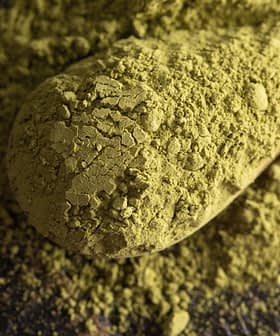New Research Shows Olive Oil's Impact on Gut Health
New research suggests that extra virgin olive oil plays a significant role in maintaining a healthy microbiota, crucial for overall health, by enhancing bacterial populations in the gut. The review highlighted the positive effects of olive-derived bioactive compounds, such as polyphenols and triterpenes, in promoting gut health and preventing various health issues by modulating the gut-microbiota-brain axis.
New research suggests extra virgin olive oil consumption plays a more significant role than previously believed in maintaining a healthy microbiota, a crucial aspect of health.
According to a scientific review published in the journal Foods, extra virgin olive oil may modulate and enhance the vast bacterial, viral, fungal, and archaeal populations inhabiting the human gut, known as the microbiota.
These microorganisms and functional cells are essential for metabolizing nutrients, drugs, and toxins, as well as for synthesizing many vitamins.
See Also:Health NewsThe microbiota also stimulates and supports the immune system, strengthening the intestinal barrier and modulating allergies, bowel diseases, metabolic syndrome, and neurodegenerative conditions.
A healthy microbiota is associated with lower risks of cardiovascular disease, cancer, obesity, diabetes and other conditions. It also impacts mood, stress response and mental health.
Researchers reviewed how olive-derived bioactive compounds promote intestinal health while modulating gut activity.
More specifically, they focused on the impact of polyphenols, secoiridoids and triterpenes on the human gut.
Although they make up less than two percent of extra virgin olive oil, these compounds can reduce inflammation and combat oxidative stress.
They help protect blood vessels, regulate metabolism and influence brain and immune function.
The review took into consideration hundreds of existing studies from a vast array of in vitro (laboratory-based), in vivo (animal studies) and human clinical trials.
The review confirmed that polyphenols, secoiridoids and triterpenes boost beneficial bacteria populations, notably Lactobacillus and Bifidobacterium.
These microbes are essential for maintaining gut balance, producing beneficial metabolites and supporting overall gut health.
The review also showed that these substances suppress potentially pathogenic bacteria, contributing to a more balanced and resilient microbial ecosystem.
One of the most critical effects highlighted by the review is the role of polyphenols, secoiridoids, and triterpenes in stimulating the production of SCFAs, which are fatty acids produced when gut bacteria break down dietary fiber and certain polyphenols in the colon.
These fatty acids are vital for nourishing the cells lining the colon, maintaining the integrity of the intestinal barrier and reducing inflammation within the gut.
According to the researchers, these olive compounds have been shown to contribute to a more robust intestinal barrier.
See Also:Mediterranean Diet and Exercise Associated with Better Gut Health in Older AdultsThis “protective shield” is considered key to preventing the leakage of harmful substances from the gut into the bloodstream, which can trigger systemic inflammation and various health issues.
The review also noted evidence from the current literature of how these olive bioactive substances can alleviate metabolic, inflammatory and neurocognitive disorders.
This wider influence is attributed mainly to their modulation of the gut-microbiota-brain axis, where gut microbes produce compounds that interact with the central nervous system.
The authors also noted some limitations due to inherent challenges in gut microbiome research.
These challenges include the vast interindividual variability in gut microbiota composition.
In addition, they noted the current lack of standardized intervention protocols across studies and the relatively limited number of human clinical trials compared to those involving animals.
In their opinion, the potential demonstrated by these substances highlights the need for more robust research to bridge findings from animal models to human physiology effectively.
The authors emphasized that future human studies must consider key individual differences, including age, diet, genetics, health status, and gut microbiota composition.
The researchers indicated that these differences can influence how people respond to olive bioactives. If ignored, they could lead to unreliable results.
The authors noted that by carefully controlling or tracking these “host variables,” researchers can enhance the quality, accuracy, and reproducibility of their findings, thereby ensuring that the observed effects are genuinely due to the compounds studied, rather than underlying personal or biological differences.
“Translating these insights into dietary recommendations and functional products will require multidisciplinary, integrative studies that combine clinical trials with advanced multi-omics and systems biology approaches,” the authors wrote.
Multi-omics refers to the integrated study of multiple biological layers, like genes (genomics), proteins (proteomics), metabolites (metabolomics) and microbes (microbiomics).
“By deepening our mechanistic understanding and standardizing olive oil compositions, we could fully unlock the therapeutic potential of olive bioactives for metabolic, inflammatory and gut-brain axis-related disorders,” the researchers concluded.







